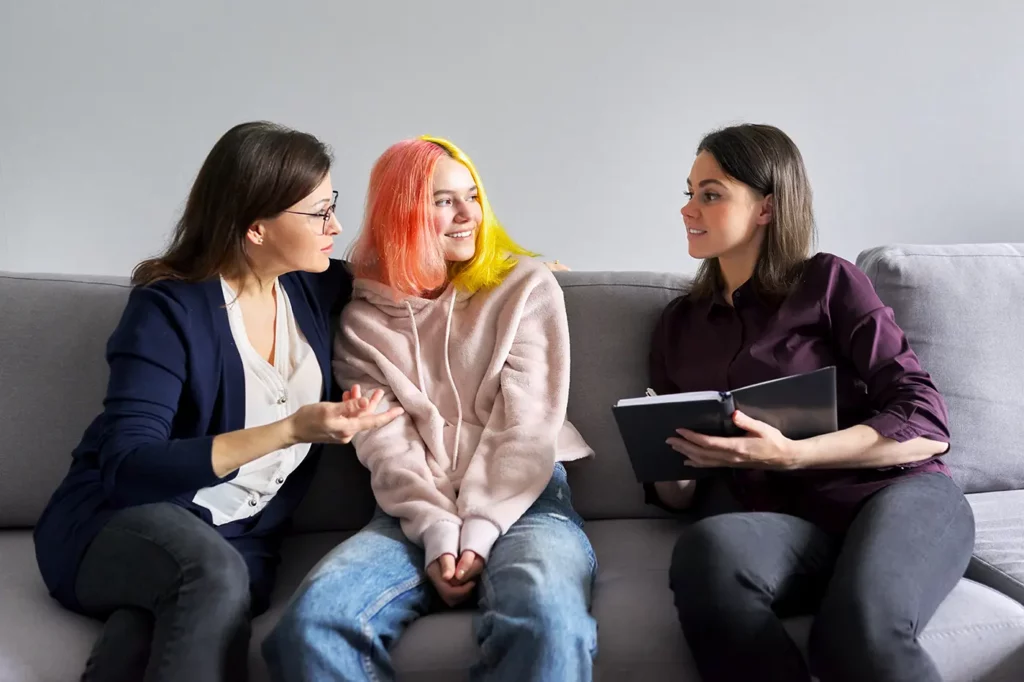Family Therapy
Family therapy is a treatment that uses group psychotherapy to improve relationships and behaviors among a family unit. This type of talk therapy can assist in various different situations, including death and grief, adjusting to a major life change or medical condition, and relationship conflicts.
Family units can come in many different sizes and configurations. They can comprise parents/guardians, children, grandparents, siblings, aunts and uncles, and so on. Those part of a unit don’t necessarily have to be related. It can also include the likes of friends and kinship carers. In summary, if you have a group of people who care for one another, they can be classed as a family unit.
Helping Families Heal
What is Family Therapy?
A trained mental health professional conducts family therapy. Operating in fields such as counseling, psychology, and therapy, they will be qualified after completing everything from a graduate degree to master’s program that specializes in working with families. With their guidance, education, and support, they can improve the functionality and overall well-being of your family unit.
While family therapy will involve the group, there are certain situations where behavioral or mental health services are provided directly to help one person within the unit. This individual could be living with depression, for instance, and family therapy will involve the unit – or multiple members from the unit – in an effort to treat the condition.


Family Therapy Massachusetts Specialists
Based in Massachusetts, Atlantic Behavioral Health is an outpatient program treatment center (sometimes referred to as an IOP) that offers a range of psychiatric services. One of those services is family therapy. Our accredited programs and courses are designed to help families resolve their issues and move toward a healthier, more fulfilling future.
We specialize in both marriage and family therapy. If an issue or situation has cropped up and damaged the construction of your family unit, our licensed and state-certified mental health professionals can build it back up again. Hosted in our welcoming and comfortable facility, we design our therapy around your specific circumstances for a personalized treatment plan.
When we welcome new clients to our facility, we take the time to understand and learn everything about their situation. By taking the time to consume this information and then applying our research and expert training, we are able to offer family therapy that will have a long-lasting positive impact.
As we feature an assortment of services, our team of allied mental health professionals can also decide if other treatment plans or co-treatment would be suitable alongside family therapy. By being able to maximize therapeutic collaboration, we can craft treatment plans that will be most effective for you and your family.
The Different Types of Family Therapy
Professional clinical mental health counselors use a range of family therapy programs. We are no different. Taking the extra step of matching up a specific family therapy program with a family’s specific circumstances and needs allows us to provide the most effective form of treatment. We can also take different elements from therapeutic approaches, combine them, and create a bespoke strategy that best matches the needs of both you and your family.
Below are common types of family therapy:
When families are dealing with adult children displaying behavioral issues, a professional will often turn to functional family therapy (FFT). With FFT, family dynamics are assessed to see how these promoted their problematic conduct. This therapy also supports positive reinforcement, along with enhancing parenting skills and family communication.
This is conducted by a licensed marriage and family therapist (LMFT) who is specifically trained to assist couples with their issues. When you are having difficulties with your spouse or partner, an LMFT will try to determine what the problems are and come up with healthy resolutions. These problems can stem from the likes of finances, mental health conditions, communication breakdowns, and raising children.
As the name suggests, structural family therapy is built around looking at the family’s structure (aka unit). This is done with an analysis of the family’s hierarchies, boundaries, and inner relationships. With family systems therapy, and to push for positive change, a therapist will zone in on direct interactions made between your family members. They use this information to spot problematic patterns, come up with alternatives, and foster a more positive structure where family members can better relate to one another.
This can make your health much worse, both in terms of mental illness and physical health, especially if you have a dual diagnosis, which is why it’s best to leave medication management to the experts.
This type of family therapy is a short-term solution that combines both functional and structural elements. Making positive changes in these areas of a family environment can support those who have adult children with behavioral problems. The foundation of this therapy is built around how the family is the key component of development and life moving forward for the adult child.
With systemic family therapy, the foundation is built around how a family’s issues are fostered through different conditions in how they live. To give an example, a therapist could look at how you function as a parent, in a relationship with your spouse or partner, and as a child to your parents. Added context can also be taken from elements like socio-economic status, political views, and religious beliefs. These aspects are all viewed as the most significant for your emotional well-being and psychological development.
How Family Therapists Help
There are different reasons why a family decides to attend therapy together. Whether it is a group effort to improve or to support an individual within a family unit, this form of therapy can assist with fixing a range of conditions and problems. These include:
- Physical and emotional trauma
- Communication issues
- Stress management
- Anxiety and depression
- Behavioral issues and improper conduct
- Grief after the death of a loved one
- Relationship issues and divorce
- Sudden challenges like incarceration, moving to a new location, and unemployment
- Dealing with a family member’s chronic or acute illness
At our Massachusetts facility, our family therapists have helped a lot of units that have a single family member over the age of 18 dealing with a mental health condition after they have stepped down from acute hospitalization. Anorexia, bipolar disorder, borderline personality disorder, obsessive-compulsive disorder, substance use disorder, and schizophrenia can all be improved with family therapy.
This form of therapy is also used by families with neurodivergent members. If someone has a condition like autism or ADHD, family therapists can offer guidance on how to live with them in a supportive, caring environment.
The Process Behind Family Therapy
An evidence-based and effective treatment, family therapy utilizes theory and skill-based dialogue. Led by an objective, supportive mental health professional, this therapy gives your family a safe and non-judgmental environment to talk openly. With expertise in counseling and specialist therapy techniques, the professional will be able to help resolve issues currently troubling your family.
As part of the process, a therapist will typically cover various points during a session. These points include:
- Ask each family member what they hope to gain from therapy. This can also involve asking them about their current challenges and concerns.
- Provide clarity and ensure everyone’s feelings and words are interpreted correctly.
- Help each family member to understand not just the impact of their behaviors but also their words during therapy.
- Encourage each participant to talk and actively listen to everyone.
- Suggest strategies and coping skills to change troublesome patterns and behaviors.
- Explore possible ways a family can make positive changes by working together.
The main aim of any family therapy course is to enhance the functionality and well-being of your family unit. This can be done by supplying you with strategies, advice, and helpful resources. When it comes to treating a behavioral or mental health condition present in one family member, therapy can give you a greater understanding of their situation, along with what positive approach the rest of your family can take.
For family therapy to work, it’s imperative for every participant to be open and actively involved. A lack of conversation between each family member will only have a negative impact on treatment. Trust also needs to be established between your family and therapist.
The number of sessions required depends on various aspects. In certain cases, therapy can be done in just a couple of sessions. Other cases can last for several months or longer.
The Benefits of Using a Family Therapist
Research has shown that family therapy can be a good fit for those hoping to improve their current situation. It can treat numerous emotional and mental conditions, as well as health issues. From obesity to substance abuse, this therapy can make a big difference. Additionally, it can reduce conflict while enhancing relationships between family members.
This can all result in additional benefits for you and your family members. If you have adult children who are currently students, they can perform better at school, whether this is university or college. You could also experience improved function and clarity when working.
If you seek a professional, proven family therapist who can make a difference, do not hesitate to contact us. We have supported many patients in the past, and we’re ready to do the same with you and your family.
Contact Us Today To Find Out More
At our specialist intensive outpatient center, we can help you and your family heal and improve your relationships. Get in touch, and we can start your recovery journey together.







